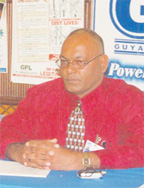-occurred in Venezuela
The contamination of Guyana Power & Light (GPL) fuel at Anna Regina in January, which resulted in massive power outages in that area and damaged engines, was caused by salt water, sand and fibres from brooms used to clean the tanks in Venezuela where the fuel was purchased.

This is according to Managing Director of GPL Bharrat Dindyal, who revealed the results of the tests run on samples in Trinidad. These results effectively rule out any fault on the part of BK International, the company that was contracted to transport the fuel to Anna Regina.
Speaking at a press conference at the NCN studios on Thursday, Dindyal said the results confirmed that the water that contaminated the fuel was salt water. He said they also discovered that two solid contaminants were involved, one of which was sand and the second a fibrous material, which “we understood was part of the brooms that were used to clean the tanks in Venezuela.
“We are able to filter out very easily the parts of the broom. The sand obviously is an entirely different matter and it is difficult to filter out. The water was easy to extract. The sand caused most of the problems at the Anna Regina power station, in fact it was able to get past our filters and damage the fuel pumps and both engines,” Dindyal said.
According to Dindyal, some US$20,400 was spent to repair the engines while the company was forced to replace a large quantity of fuel filters and after some work the problems were corrected and the power station was returned to full operation. Another shipment of fuel has since been dispatched to the station and it was transported by BK.
Meanwhile, in relation to the Skeldon power station, Dindyal said that earlier this month a vessel was used for the first time to transport fuel to that station and out of an abundance of caution samples were taken from all eight compartments of the vessel and analysed for water and all passed the test. The power company will continue to use the ship to transport fuel to that station and also for other purposes.
RUSAL, the Russian bauxite company, which operates at Aroaima in Guyana, has since purchased the contaminated fuel at the same price the power company had purchased it.
The contaminated fuel had been delivered to Anna Regina and had caused extensive power outages on the Essequibo Coast from January 10 to 14.
In a press release, GPL had said that the outages were due to “a batch of fuel that was received at the Anna Regina Power Station over the weekend being contaminated.” GPL had said engineers at the power station discovered that some mechanical problems had developed on the two Wartsila units as a result of the contamination and it had flown in a high-level technical team and spare parts to effect immediate repairs to the engines.
The company had said that it was working along with the shipper responsible for the movement of the fuel from Demerara to Essequibo to determine how it had become tainted.
In another statement GPL had said that the contamination occurred at Anna Regina while adding that on January 9, 4,000 barrels of heavy fuel oil were dispatched in two equal shipments to the station. Fuel was also sent on January 14. It had said that both shipments arrived at the plant contaminated with water and “some foreign solid matter”.
BK International had been responsible for shipping the fuel and in a letter to the newspapers, responding to a Kaieteur News article, the company had accused the newspaper of seeking to convey the “false impression” that it was responsible for the contamination of fuel delivered by its vessel to GPL’s Essequibo power station.
BK’s Office Manager Egan Bazilio had said in the letter that as a result of a meeting held with the GPL management it was agreed that a series of tests would be conducted on the fuel.





